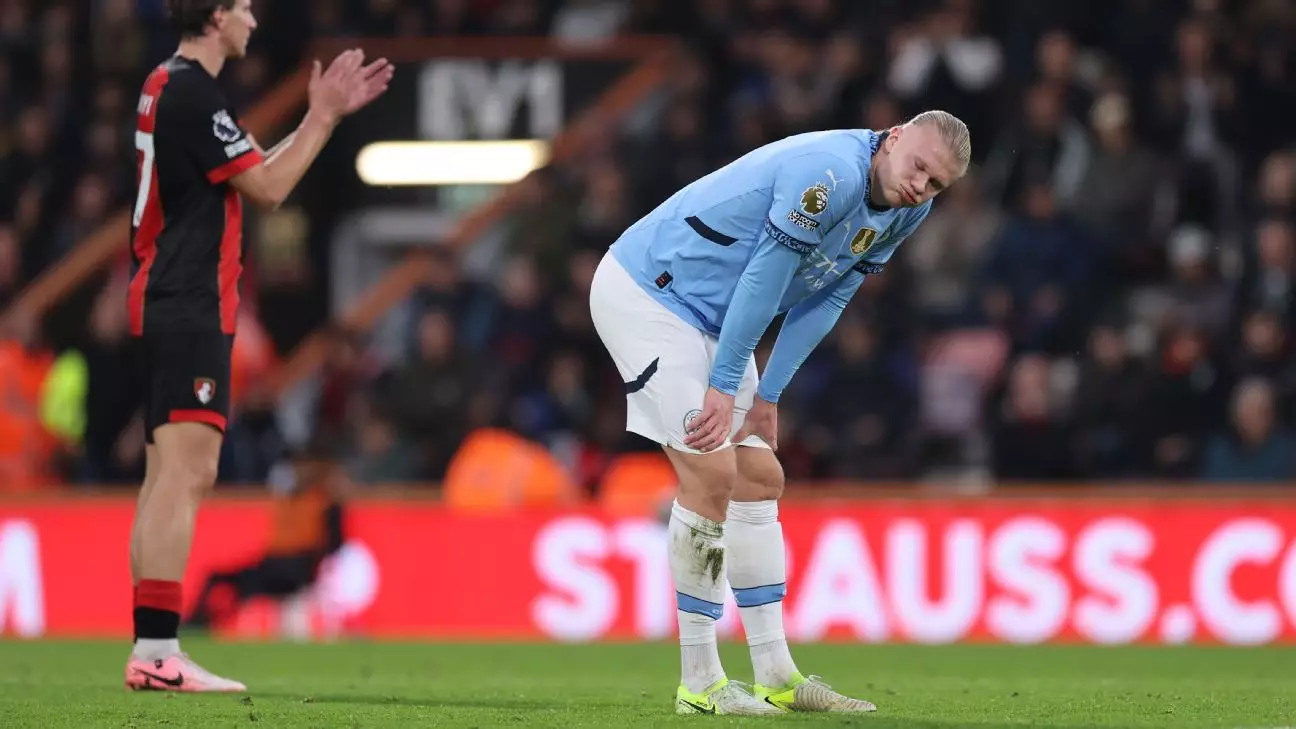The landscape of European football is in constant flux, and the most recent developments across the continent this past weekend provide a vivid testament to this reality. Despite a mere three months into the Premier League season, the results of this weekend have raised pivotal questions regarding team standings and future performances as clubs eagerly jockey for positions ahead of the winter break.
The Premier League’s latest round of matches served as a reminder of the unpredictability that often characterizes this illustrious competition. Manchester City, previously leading the charge, faced an unexpected setback against AFC Bournemouth, marking an alarming loss that relegated them from the top of the standings. A combination of injuries to key players—including John Stones and Rodri—adversely affected their performance, resulting in a lack of creativity that ultimately cost them the match, ending their unbeaten streak in the league.
On the other hand, Liverpool capitalized on this opportunity, emerging victorious against Brighton & Hove Albion in a hard-fought comeback that not only boosted their points tally but also elevated them to the league summit. This win was significant, showcasing their resilience as they came from behind to claim a 2-1 victory. In stark contrast, Arsenal’s struggles continued as they succumbed to a narrow defeat against Newcastle United, leaving them outside the top four and raising more questions regarding Mikel Arteta’s tactics as they now sit fifth in the standings. Such variations at the top indicate that this season might follow an unconventional trajectory.
While the Premier League witnessed its share of dramatic swings, the situation in Spain put football into stark perspective. The country was reeling from devastating floods that claimed over 200 lives, prompting La Liga to postpone matches involving Valencia and Villarreal as a mark of respect. The decision to continue with other fixtures drew mixed reactions, with Atlético Madrid’s coach Diego Simeone criticizing the choice given the surrounding circumstances.
A notable sentiment from players and coaches underscored a sense of remorse, as some dedicated their performances to victims of the catastrophe. Barcelona managed to navigate through the chaos with a win, yet their triumph felt overshadowed by the tragedy unfolding beyond the pitch. Girona’s thrilling encounter against Leganés stood out with goals galore but couldn’t mask the grim reality underscoring the weekend’s events in the country.
Turning our gaze to Germany, Bayer Leverkusen’s campaign has evolved into a rollercoaster ride following their unexpected title triumph last season. Their recent inability to score in a disheartening draw against VfB Stuttgart demonstrates ongoing struggles. With Leverkusen now trailing seven points behind the top, their previously invincible air has dulled, raising concerns about whether they can maintain last season’s momentum.
Bayern Munich steadily reinforced their dominance with a convincing victory over Union Berlin, while RB Leipzig faltered against Borussia Dortmund. This disparity in performance reiterates the ongoing challenges that clubs face navigating the Bundesliga’s unpredictable waters, especially for teams like Leverkusen aiming to sustain competitive form. Precision in converting chances remains their Achilles heel, leaving fans and analysts alike pondering how long this trend might persist.
Elsewhere in Europe, clubs are also experiencing thrilling highs and disheartening lows. In Portugal, Viktor Gyökeres is capturing headlines with an exceptional four-goal game that led Sporting CP to another decisive win, solidifying his status as a leading scorer. His performance speaks volumes about Sporting’s ambitions this season, especially with an impending match against high-profile Manchester City highlighting the potential for emerging talents to assert themselves on larger stages.
Contrastingly, in Austria, RB Salzburg finds itself grappling with challenges under Pepijn Lijnders. Once the runaway leaders, their uninspired form has left them trailing behind Sturm Graz, raising skepticism about their ability to regain their former dominance. The pressure is mounting on Lijnders as the repercussions of another disappointing Champions League outing loom large.
As the European football season shapes up and dynamic shifts unfold, one thing is evident: the gaps between the top and bottom clubs are perpetually narrowing, making every match week critical. With injuries, strategic missteps, and external factors like natural disasters all influencing outcomes, teams must continuously adapt to remain flexible and competitive in this exhilarating realm.
This weekend may only mark a few chapters in a long season, but its events raise vital questions about which teams will rise and which will fall as the race to May continues.

